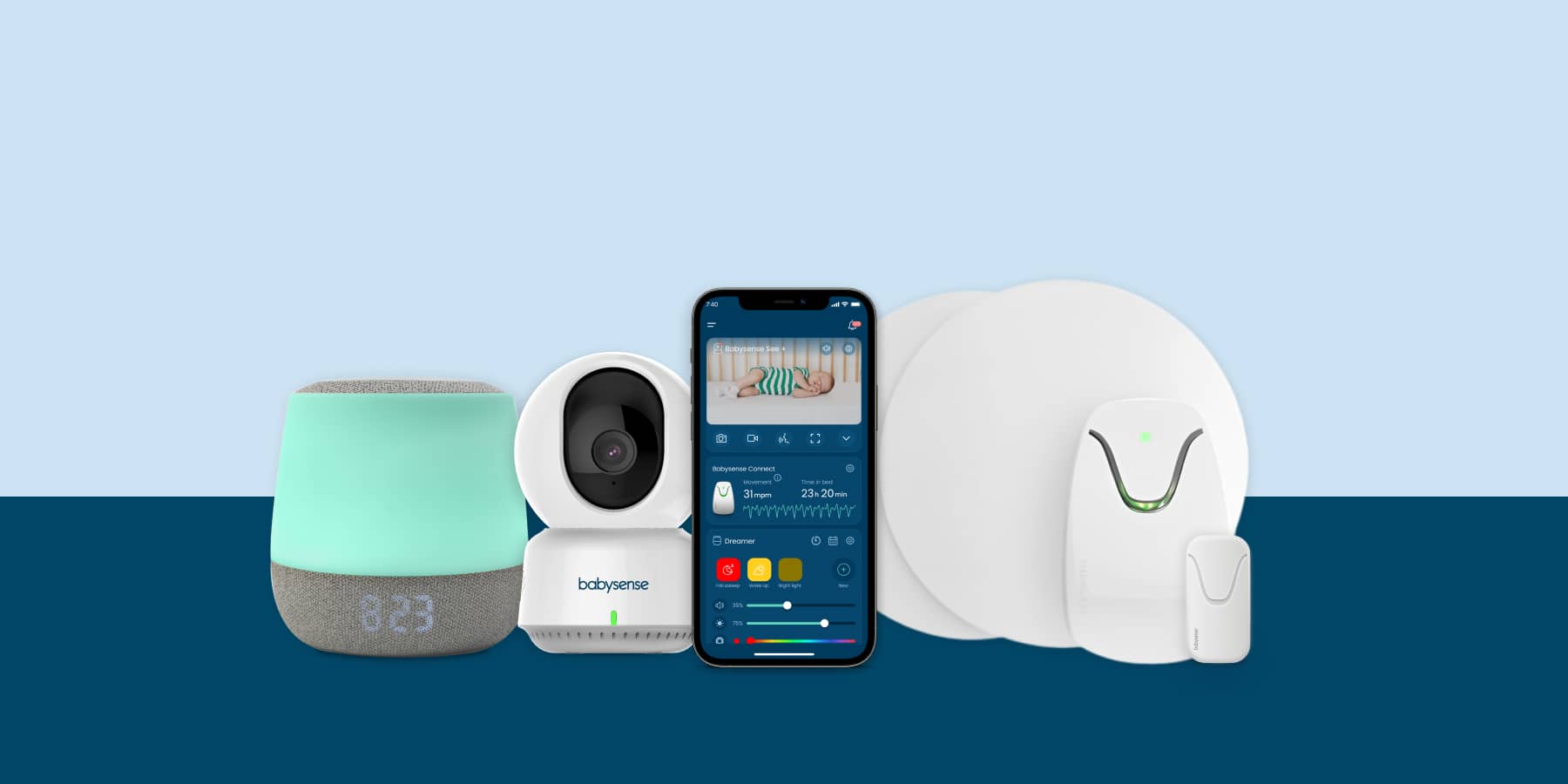Caring for a newborn baby can be a difficult time for parents. One of the most demanding parts is adjusting to the baby's sleep pattern, which often keeps you up at all hours of the night. Babies will not follow a regular sleep schedule until they are around 3 to 4 months old. This means that for the first two months, your newborn will sleep when they want.
Some nights you will be able to get a full night's rest, while others, you might not be so lucky. Although there is no normal sleep schedule for a newborn, there is some valuable information to know about how newborns sleep, which we will explain below.
How Much Sleep Does A 1-Month-Old Need?
A 1-month-old baby will, on average, spend around 15 and a half hours sleeping every day. Because babies can only stay awake for up to 90 minutes, you can expect lots of time spent asleep during the day. For many parents, it can feel like you spend most of the day feeding and changing diapers whilst your baby just sleeps.
A helpful tip that many parents find useful in caring for their newborn is to follow an "eat, play, sleep" schedule. It involves feeding your baby when they first wake up and then following up with some activities that allow the newborn to process the food and become tired. You can then change their diaper before they are ready for another nap.
How Often Should A 1-Month-Old Be Awake?
Newborn babies do not spend a lot of time awake in their first couple of months. On average, they will only stay awake for around 30 to 90 minutes before they settle back down for another nap. These naps can last between 20 minutes and up to 4-5 hours, so don't expect to be able to time them perfectly.
For example, if your newborn wakes up from a nap at midday, they will be ready for another rest between 12:30 and 1:30. Over the course of a day, a newborn is expected to have around 7-8 naps.
As your newborn becomes older, you can expect the periods spent awake to increase and the length of naps also to increase. This will naturally reduce the number of naps that your baby takes throughout the day and make it easier to predict your baby's sleep pattern.
Typical Baby Sleep Schedule For A 1-Month-Old
Here is one example of how you might expect your little one to sleep throughout the day. This can vary between every child, so don’t be alarmed if your day looks different.
On some days, your baby may take much longer naps or have slightly longer or shorter periods of wakefulness.
|
Rise for the morning |
6:45 AM (45 minutes of wakefulness before their first nap) |
|
1st nap of the day |
7:30 AM - 8:45 AM (1 hour 15 minute nap) |
|
2nd nap of the day |
9:45 AM - 11 AM (1 hour 15 minute nap) |
|
3rd nap of the day |
12:15 PM - 1:15 PM (1 hour nap) |
|
4th nap of the day |
2:30 PM - 4 PM (1 hour 30 minute nap) |
|
5th nap of the day |
5:15 PM - 5:45 PM (30 minute nap) |
|
6th nap of the day |
7 PM - 7:30 PM (30 minute nap) |
|
Get ready for bed |
After an hour of wakefulness, it is time to get your baby ready for bed |
|
Night’s sleep |
Your baby will settle down for a night's rest after a long day of eating and sleeping! |
Napping For A 1-Month Old
How long should a nap be for a 1-month-old?
The length of naps for newborns will vary considerably for the first couple of months. Newborn sleep schedules don't form until they are around 3-4 months old. Naps can last anywhere between 10 minutes and 2 hours.
How many naps should they take in a day?
A 4-week old baby will take, on average, six naps per day. Each nap length will vary from 30 minutes up to 2 hours. Because baby sleep schedules are irregular when they are newborns, predicting sleep cycles is tricky. We don't recommend that you try to maintain a specific baby sleep schedule until they are a little older.
One thing that you can expect from your newborn is plenty of naps throughout the day and short periods of wakefulness for food and comfort. Some babies will naturally fall into sleep patterns from a young age, so you might be able to become familiar with your baby's sleep patterns but do not worry if not. Of course, using video baby monitors as your newborn gets older and develops more of a routine can be extremely useful for keeping track of your little one's sleep habits. Even in the first few weeks of their life, a baby monitor can provide you as parents with reassurance that your little one is sleeping peacefully.
Bedtime For A 1-Month Old
What time should a 1-month-old go to bed?
There isn't a set time for 1-month old babies to sleep as their sleep schedule is highly irregular. Because they spend a lot of time napping throughout the day, newborns often have a bedtime routine that starts quite late. The most important thing to realize is not to be alarmed if your newborn starts their nighttime sleep stage later than you expected.
It is quite common for newborns to fall asleep for the night at 11 PM or later. As they grow older, their sleep schedule will become more predictable, and they will start to opt for sleeping at an earlier bedtime. This usually occurs when they reach the 3-4-month-old stage.
How long should a 1-month-old's nighttime sleep be?
A newborn sleep schedule will, on average, involve around 9-12 hours of sleep through the night. Unfortunately, this is usually broken up with times of wakefulness for feeding and comfort. You will most likely find yourself up at all times of the night attending to your newborn in their first month at home, and you may find that one of our baby breathing monitors can help you keep track of your baby's wakefulness and sleep.
On the bright side, although these times can be pretty challenging for first-time parents, they offer precious times with your newborn for bonding. You will also be pleased to hear this doesn't last forever. After around 3-4 months, your baby's sleep schedule will start to change. They will sleep for longer and wake up less. This slowly increases as they get older and the chance of them sleeping through the night becomes greater. This means more sleep for you, parents!
How to Help Your Baby Get To Sleep
Getting your newborn to fall asleep can be challenging, especially for new parents. There is no single secret method to make your baby fall asleep instantly, but there are a few things you can do which can help.
Build a solid feeding and sleep schedule
Babies respond to their environment, which means that if you feed them and put them down for a nap at a similar time each day, they begin to form something of a sleep schedule. This can make it a lot easier to predict when your baby will next sleep as they will understand when it's time to nap.
Some things you can do to initiate the beginning of nap time is to dim the lights around 30 minutes before bedtime. The baby will start to associate light with wakefulness and darkness with sleeping, making it a lot easier to form healthy sleep habits and a more regular sleep schedule.
Watch out for sleep cues
Sleep cues are some of the best ways to recognize when your newborn is ready to sleep. If your baby starts to look away from your direct gaze and begins to have an unfocused gaze into the distance, then the chances are they are ready for a nap. Other cues include the baby placing and stroking their head against you.
It is important that you notice these sleep cues early on, as it can be hard to get a newborn to sleep once they are too tired.
Don't keep them awake for too long
Contrary to what you might think, it is a lot easier for a baby to fall asleep if they are well-rested as opposed to overtired. This is because a lack of sleep produces a stress hormone in newborns, which reduces the length of time spent asleep. This means more time spent awake through the night, which is not ideal for both the baby and the parents, who likely have to get up for work in the morning.
If you’re looking for quick ways to get your little one sleeping peacefully, our guide on how to put a baby to sleep in 40 seconds will be the perfect read.
Don't be afraid of 'spoiling' them
Babies enjoy feeling comfortable and safe, so don't be afraid to hold and cradle them if they are struggling to sleep. The more relaxed a newborn is, the easier it will be for them to start sleeping and the longer they will stay asleep without waking up.
FAQs
Will a 1-month-old baby sleep through the night?
A 1-month old baby cannot be expected to sleep throughout the entire night. They will wake up multiple times during the night for nourishment and comfort. Each baby's sleep schedule will differ, so it's best to speak to a paediatrician to figure out the right amount of feeding suitable for your child.
How long should a 1-month-old be awake between naps?
As mentioned before, the time spent awake between naps can vary greatly. On average, a newborn can be expected to be awake for 30-90 minutes before they are ready for another snooze. In the morning, periods spent awake are usually shorter and progressively get longer as the day goes on. Ideally, you don't want your baby to sleep for more than 90 minutes just before bedtime.
Why does my baby sleep more during the day than the night?
Newborns haven't yet developed the ability to know when to wake up when they are well-rested or go to sleep when they are exhausted. This is learned with time, so their sleep schedule can be quite irregular in the first months of sleeping. This means that it is quite common for babies to spend a lot of time sleeping during the day and less time at night.
There are some things you can do to help your baby develop this ability sooner. Things like dimming the lights before bedtime will help your baby associate sleeping with darkness and daylight with wakefulness.
What are "sleep regressions"?
Baby sleep regressions are when your baby resorts back to an old sleep schedule. This can result in your newborn waking up a lot more often during the night. They usually have a much harder time falling back asleep as well. Sleep regressions are perfectly normal and are actually a sign of your baby's brain developing.
Sleep regressions usually occur at around the 4-month mark and typically last between 2-4 weeks. It should be noted that not all babies will have a sleep regression at this time.








